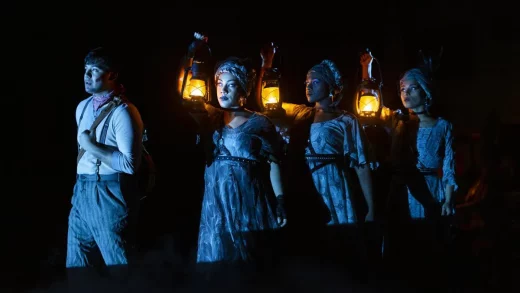:format(webp)/https://www.thestar.com/content/dam/thestar/entertainment/music/2022/12/06/cadence-weapon-launches-campaign-to-help-artists-keep-merchandise-profits/cadence_weapon_2022_pr_9_by_mat_dunlap.jpg)
It may be the most unkindest cut of all for touring musicians and Cadence Weapon wants it to stop.
The Polaris Music Prize winner, a.k.a. Rollie Pemberton, has announced an initiative that he hopes will stop an enduring music industry practice: venues taking a percentage of an artist’s merchandising sales, which Pemberton said is undeserved.
“The thing that is really frustrating about this is that we (artists) pay for the merch to be manufactured,” he said during a recent phone call. “We pay for the art to be designed; we pay for it to be shipped to and from the venue — and sometimes across borders, where we have to pay duty — and yet the venue is still taking a cut of it, even though they had no role in the making of it.”
Pemberton said venues often extract 15 to 35 per cent of merchandising sales, which can amount to hundreds and thousands of dollars depending on the size of the venue.
“I played a lot of festivals this year and I had to kick in hundreds of dollars over the summer,” he complained.
One of the reasons that Pemberton wants to change the system is that post-pandemic touring costs that have greatly escalated since musicians and recording artists returned to live performance. Merchandising income, he said, “is traditionally where musicians make money on tour” and can make the difference between “breaking even on a tour and losing money.”
“It’s never been more precarious to be a touring musician in history, really,” Pemberton said. “We’re suffering way higher costs for gas, tour bus, flights, hotels, hiring lighting technicians, hiring a tour manager: all the prices have gone up with inflation. And we’re also in a particularly dangerous situation with COVID where our work environment is unsafe.”
Pemberton said while some merch cut requests are clearly outlined in performance contracts, others are sprung on artists at the last minute.
“It’s definitely happened where you’re at the end of the show and you’re putting away your gear or putting away your merch, and someone from the venue is saying, ‘Yeah, we take 20 per cent’ or whatever.”
Pemberton said the percentage is so exorbitant in some venues that “I won’t even bring merch sometimes.”
His solution is to join forces with the U.K. non-profit organization Featured Artists’ Coalition and U.S. non-profit Union of Musicians and Allied Workers to launch the #MyMerch campaign: it’s an effort to get hosting venues to forgo requesting or receiving any share of the money acts make selling merchandise at their shows.
Pemberton’s alliance happened by chance and kismet.
“It’s an idea I’ve had for a while,” he said. “In response to the article I wrote for Toronto Life about touring where I mention merch cuts, I heard from the Union of Musicians and Allied Workers. They reached out to me and said, ‘Hey, we’re actually working on a campaign about abolishing merch cuts.’ Since we were coincidentally working on the same thing, we decided to join forces.”
So far, Pemberton has had some local and national success on the festival and club levels: Toronto’s NXNE and Pop Montréal have promised to forgo merch cuts, as has Toronto’s Tranzac Club.
Pemberton said an “artist-friendly” directory is being assembled.
“We’re compiling this list and it’s not really about shaming people who are not on the list, but creating a directory of venues where artists and fans know that they have our best interests in mind,” he explained.
He views it as “a workers’ rights issue.”
“A lot of it reminds me of extortion,” Pemberton said. “That’s what this is: taking tax off the top arbitrarily from artists. What if I say no? You’ll never book me again at this venue? That’s what it feels like.”
Shaun Bowring, owner of Toronto venues the Garrison and Baby G, said his businesses have never taken a cut of musician’s merch proceeds, but he understands “both sides of the coin.”
“It’s a fairly common practice and usually involves bigger venues,” Bowring said. “I assume it helps the bottom line. It’s not an easy business to actually make some money on. I see both sides and I get it, but I’ve always thought that when you’re putting on a show with a band that it’s a partnership.”
Jesse Kumagai, president and CEO of Massey Hall, acknowledged in a statement that the recently restored historic venue does engage in “collecting a commission on merchandise sales at Massey Hall to offset infrastructure and labour costs.”
But he said the practice will not be enforced in two new Allied Music Centre venues that the organization will debut in 2023.
“We also recognize the importance of merchandise sales for emerging artists and, as such, will not be collecting any commissions in our new smaller venues designed to support artist development,” Kumagai said.
However, Pemberton wants to permanently abolish the practice of venues dipping into the pockets of touring acts.
“This is only the first step: what I’m talking about is reforming the entire music industry,” he said. “ The only way we’re going to be able to survive as artists is if we fight for our rights and it’s the only way we’re going to see a better future for the younger artists who are coming after us.
“We don’t have the same kind of union protections that a factory worker would have and yet our work environment is becoming increasingly unsafe. I know several musicians who have long COVID now and they’re not able to perform anymore. And that’s the risk that we take every time we play a show now.
“It’s on a lot of people’s minds and I’m done with the ‘way things were done in the past’ mentality. We’re looking for a new normal with this campaign.”
JOIN THE CONVERSATION


